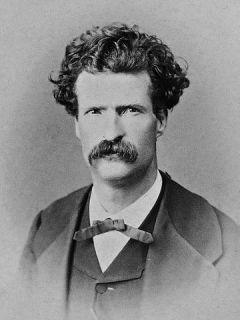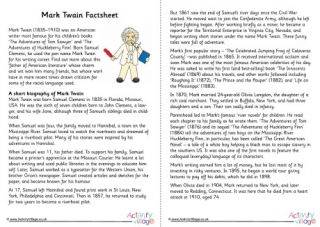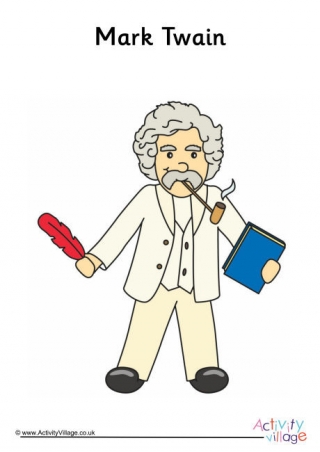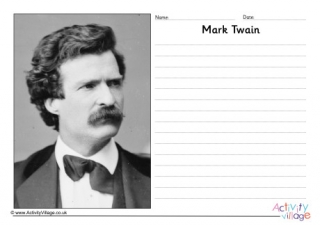Mark Twain (1835–1910) was an American writer most famous for his children’s books ‘The Adventures of Tom Sawyer’ and ‘The Adventures of Huckleberry Finn’. Born Samuel Clemens, he used the pen name Mark Twain for his writing career. Here you can find out more about this ‘father of American literature’ whose charm and wit won him many friends.
Fun Facts
- Samuel Clemens was born shortly after the appearance of Halley’s Comet in 1835. He believed that he would ‘go out with it’ as well. Halley’s Comet appears about once every 75 years, and Samuel died the day after its return in 1910.
- The pen name Mark Twain comes from a riverboat term measuring the water’s depth. A ‘mark’ stood for a fathom or six feet, while ‘twain’ meant two. If a man called out ‘Mark Twain’, it meant the water was 12 feet deep and safe for riverboats of the time.
Favourite Mark Twain Quotes
“The secret of getting ahead is getting started.”
“The two most important days in your life are the day you are born and the day you find out why.”
“If you love what you do you’ll never work another day in your life.”

A Short Biography of Mark Twain
Mark Twain was born Samuel Clemens in 1835 in Florida, Missouri, USA. He was the sixth of seven children born to John Clemens, a lawyer, and his wife Jane, although three of Samuel’s siblings died in childhood.
When Samuel was four, the family moved to Hannibal, a town on the Mississippi River. Samuel loved to watch the riverboats and dreamed of being a riverboat pilot. Many of his stories were inspired by his adventures in Hannibal.
When Samuel was 11, his father died. To support his family, Samuel became a printer’s apprentice at the Missouri Courier. He learnt a lot about writing and used public libraries in the evenings to educate himself. Later, Samuel worked as a typesetter for the Western Union, his brother Orion’s newspaper. Samuel created articles and sketches for the paper, and became known for his humour.
At 17, Samuel left Hannibal and found print work in St Louis, New York, Philadelphia and Cincinnati. Then in 1857, he returned to study for two years to become a riverboat pilot.
But 1861 saw the end of Samuel’s river days once the Civil War started. He moved west to join the Confederate Army, although he left before fighting began. After working briefly as a miner, he became a reporter for the Territorial Enterprise in Virginia City, Nevada, and began writing short stories under the name Mark Twain. These funny tales were full of adventure.
Mark’s first popular story – ‘The Celebrated Jumping Frog of Calaveras County’ –was published in 1865. It received international acclaim and soon Mark was one of the most famous American celebrities of his day. He was asked to write his first (and best-selling) book ‘The Innocents Abroad’ (1869) about his travels, and other works followed including ‘Roughing It’ (1872), ‘The Prince and the Pauper’ (1882), and ‘Life on the Mississippi’ (1883).
In 1870, Mark married 24-year-old Olivia Langdon, the daughter of a rich coal merchant. They settled in Buffalo, New York, and had three daughters and a son. Their son sadly died in infancy.
Parenthood led to Mark’s famous ‘river novels’ for children. He read each chapter to his family as he wrote them. ‘The Adventures of Tom Sawyer’ (1876) and its sequel ‘The Adventures of Huckleberry Finn’ (1884) tell the adventures of two boys on the Mississippi River. Huckleberry Finn, in particular, has been called ‘The Great American Novel’ – a tale of a white boy helping a black man to escape slavery in the southern US. It was also one of the first novels to feature the colloquial (everyday) language of its characters. Mark Twain's "river books" have been banned in places as some characters in them use offensive, racist language that was common at the time of writing.
Mark’s writing earned him a lot of money, but he lost most of it by investing in risky ventures. In 1895, he began a world tour giving lectures to pay off his debts, which he did in 1898.
When Olivia died in 1904, Mark returned to New York, and later moved to Redding, Connecticut. It was here that he died from a heart attack in 1910, aged 74.
Our Mark Twain Activities
























